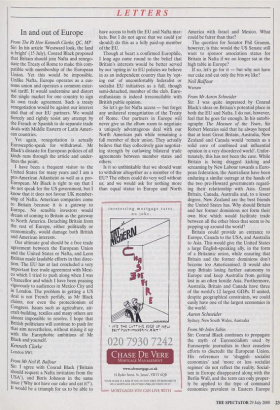LETTERS In and out of Europe
From The Rt Hon Kenneth Clarke, QC, MP Sir: In his article 'Westward look, the land is bright' (15 July), Conrad Black proposed that Britain should join Nafta and renego- tiate the Treaty of Rome to make this com- patible with membership of the European Union. Yet this would be impossible. Unlike Nafta, Europe operates as a cus- toms union and operates a common exter- nal tariff. It would undermine and distort the single market for one country to sign its own trade agreement. Such a treaty renegotiation would be against our interest and that of our EU partners. We would fiercely and rightly resist any attempt by the French or Spanish to do separate trade deals with Middle Eastern or Latin Ameri- can countries.
Yet again, renegotiation is actually Eurosceptic-speak for withdrawal. Mr Black's distaste for European policies of all kinds runs through the article and under- lines the point.
I have been a frequent visitor to the United States for many years and I am a pro-American Atlanticist as well as a pro- European. Mr Black is right to say that I do not speak for the US government, but I know that it does not favour UK member- ship of Nafta. American companies come to Britain because it is a gateway to Europe. No sensible investors would dream of coming to Britain as the gateway to North America. Detaching Britain from the rest of Europe, either politically or economically, would damage both British and American interests.
Our ultimate goal should be a free trade agreement between the European Union and the United States or Nafta, and Leon Brittan made laudable efforts in that direc- tion. The EU has at last concluded a very important free trade agreement with Mexi- co which I tried to push along when I was Chancellor and which I have been praising vigorously to audiences in Mexico City and in London. The problem in getting a US deal is not French perfidy, as Mr Black claims, nor even the protectionism of Congress. Issues such as agriculture, air- craft-building, textiles and many others are almost impossible to resolve. I hope that British politicians will continue to push for that aim nevertheless, without mixing it up with the Europhobic ambitions of Mr Black and yourself.
Kenneth Clarke
London SW1


























































 Previous page
Previous page